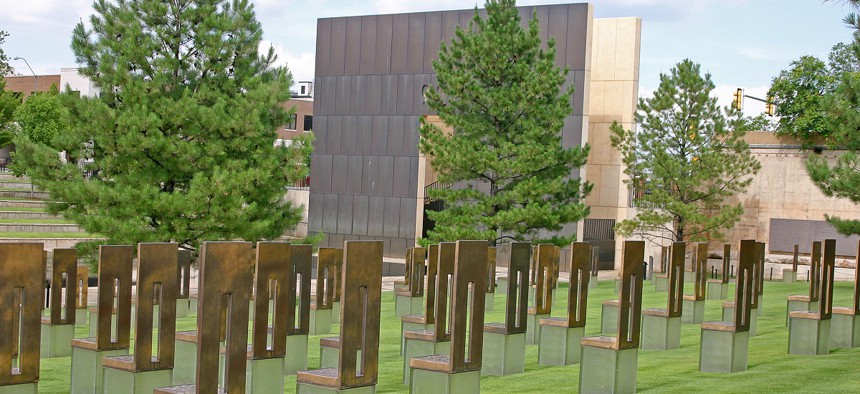Opinion: From Oklahoma City to today, defending democracy against division
The Jan. 6 insurrection proves the legacy of Timothy McVeigh, who grew up in Buffalo, has only grown more powerful.

The Field of Empty Chairs at the Oklahoma City National Memorial AwakenedEye
As we marked 29 years since the devastating bombing of the Alfred P. Murrah Federal Building in Oklahoma City on Friday, it's essential to reflect not just on the lives lost and shattered that day but also on the lingering specter of right-wing violence that continues to haunt our nation. The shockwaves of that tragic event reverberate to this day, serving as a grim reminder of the persistent threat posed by right-wing and authoritarian movements in America.
Timothy McVeigh's legacy extends far beyond that tragic day in April 1995. The storming of the U.S. Capitol on January 6th has its roots in the deadly violence he perpetuated 29 years ago. What may have once seemed like a fringe politic far from the halls of power is now mainstreamed and upheld by many elected officials at the local and national level – not least of which is the former president and presumptive Republican presidential nominee, Donald Trump. The movements that created McVeigh have only grown more powerful these last decades and now pose an existential threat to our democracy.
Right-wing and authoritarian forces are incredibly competent at helping white people make sense of a complex and frightening world full of the suffering of people of all races - white, Black, and brown. This was certainly true for McVeigh.
Timothy McVeigh grew up in Buffalo, New York, in a white working-class family. The deindustrialization of the Rust Belt defined his life. McVeigh's economic alienation and perceived loss of social power led him to find meaning in anti-government politics, which share common roots with white supremacist movements, and ironically today, find new expression in authoritarian movements. McVeigh spent years bouncing around from gun show to show, selling copies of the right-wing fever dream The Turner Diaries, and found the logical conclusion of his ideas, lifted by a community of like-minded people, to be horrific violence.
When we leave sense-making for white people to right-wing organizations and white supremacist and authoritarian movements, we end up with the terror of Timothy McVeigh and the assault on democracy that was January 6th.
Timothy McVeigh could have been my neighbor or even a distant cousin. Like him, I am also from Buffalo and was raised in a working-class family in the long shadow of deindustrialization. But that is where the similarities end. My father was a dedicated union member. I was exposed to progressive political organizing and shows of solidarity in the face of economic exploitation at a young age. After college, I returned home to organize in Buffalo against industrial polluters who were making community members and workers sick. This gave me a deep hope that we can change our world by coming together across lines of difference to find a common interest and connection. I found meaning in action, and that logical conclusion of what I was learning is a truly multi-racial and pluralistic community under attack from the contemporary iteration of McVeigh's politics.
While Timothy and I are very different people, we both found belonging in different communities that helped us each make meaning of the world. Just like for him 29 years ago, today, under the banner of MAGA and in response to a reinvigorated civil rights movement, authoritarian forces are using the campaign and then the presidency of Trump to make meaning for millions of Americans.
Organizations like Showing Up for Racial Justice, which I lead, are specifically targeting those presumed to be susceptible to the rhetoric of the MAGA crowd - working-class and poor white people - and integrating them into multi-racial movements for justice. By creating pathways to belonging and hope, we divert individuals from the path of violence and towards solidarity and democracy.
We've been at work for years organizing white people away from the far-right. Following the events of Charlottesville, reports emerged of the Ku Klux Klan recruiting individuals in rural Tennessee. In response, we supported members in the community to start knocking on doors. Through door-to-door canvassing and community engagement we asked residents questions about the Klan's impact on their town and the community's true needs. This approach revealed widespread concerns about housing issues, including high rents, exploitative landlords, and substandard living conditions. We launched organizing campaigns focused on housing rights, resulting in tangible victories such as preventing evictions during the COVID-19 pandemic, addressing code violations, and electing a pro-renter city council member who defeated a 23-year incumbent in a town where Trump had won by a 70-point margin. We effectively recruited the same people the far-right groups tried to recruit, into multi-racial efforts for change.
While defeating Trump and the authoritarian forces he represents remains an immediate imperative, it is essential to recognize that the work of building a multi-racial democracy extends beyond any single election. A necessary part of this work is interrupting the pipeline of radicalization set by authoritarians. Instead of the messages of division and racism Timothy MvVeigh received, we must bring white people in on the basis of solidarity.
As we remember the anniversary of the Oklahoma City bombing, let us recommit ourselves to the fight against the politics of hate, division, and violence in all of its forms. Let us honor the memory of the victims and survivors by standing up to hate and bigotry wherever we find it. And let us work together to build a future where justice, equality, and democracy prevail.
Erin Heaney is the executive director of Showing Up for Racial Justice, the largest racial justice organization explicitly organizing white people in U.S. history. She grew up and lives in Buffalo, New York.